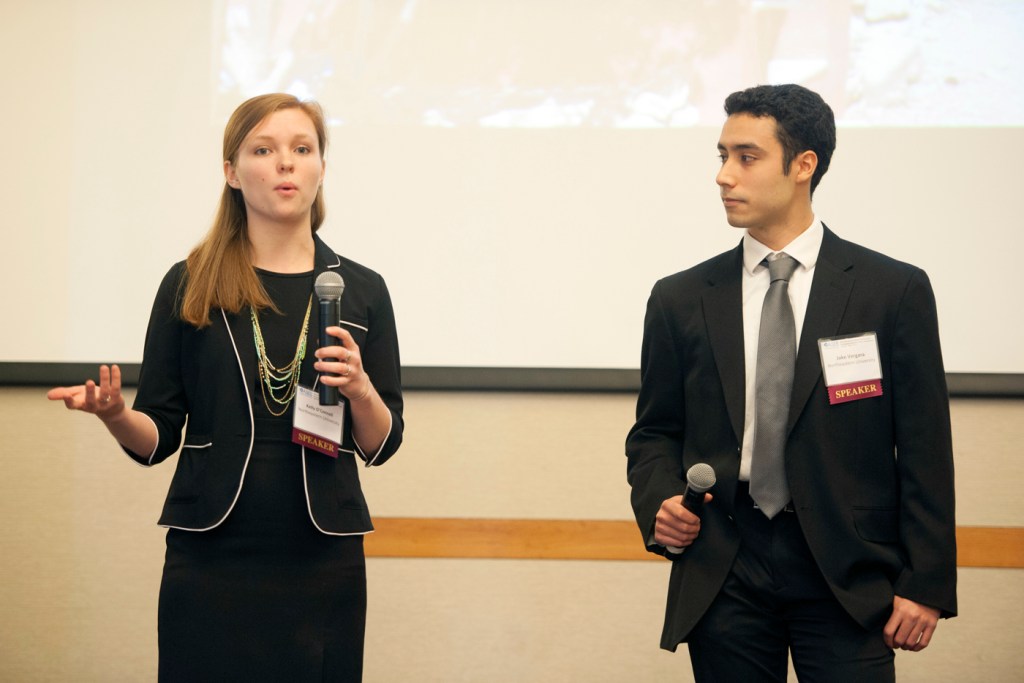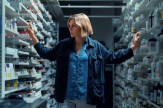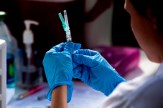How to turn a student into an engineer

Two young humanitarians reflected on their life-changing work for Northeastern University’s student chapter of Engineers Without Borders on Friday afternoon, focusing on how their experiences have shaped their engineering skills, global perspectives, and co-ops.
Their lunchtime presentation in the Curry Student Center Ballroom marked the midpoint of day one of the three-day Northeast Section American Society for Engineering Education Conference, which was held at Northeastern last week.
The conference’s theme—“Professional Formation of Engineers”—mirrored the subject of the talk, which was delivered by Kelly O’Connell, E’16, and Jake Vergara, E’17.
“Working with EWB has been a very positive and transformative experience for me,” said Vergara, a third-year chemical engineering major. “The opportunities that I’ve had have helped me develop into a better person and into a better engineer.”
Engineers Without Borders—USA works on some 680 water, sanitation, and renewable energy projects in more than 30 developing countries around the world. Northeastern’s student chapter of the organization, founded in 2005, has brought potable water to thousands of villagers in Bbanda, Uganda, and El Carrizalito, Honduras.
In February, the group received the 2014 Premier Chapter Award from EWB—USA. The high honor marked the first national award for the group, which has also won three regional awards.
O’Connell, the president of the student group, has twice visited Uganda to help manage construction of a water distribution system for some 1,100 villagers. A fluent Spanish speaker, Vergara traveled to Honduras this past winter to serve as the team’s translator.
The duo filled their hourlong lecture with anecdotes of their EWB experiences, stories showcasing the ways in which this hands-on opportunity has turned two curious students into a pair of prototypical engineers-in-training.
O’Connell, now a fourth-year civil engineering major, recalled her first task on behalf of the student group, an assignment that she undertook as a curious freshman: In the fall of her first year, she was asked to research the pros and cons of the centrifugal submersible pump—the type of pump that the budding engineers subsequently implemented in their potable water projects in Uganda and Honduras—and then report her findings to her peers.
“I knew that they were relying on me,” O’Connell recalled, “and this assignment helped me to develop the autonomy and the responsibility that is needed to succeed in the group setting.”
In the spring of her freshman year, she joined the group’s eBoard, through which she subsequently honed her communication skills. “I learned how to develop presentations, talk to corporate donors, and delegate tasks,” she said, noting that she currently oversees more than a dozen eBoard members.
During her first experience in Bbanda, O’Connell discovered the importance of making personal connections with the people for whom she worked. She—and two of her peers—had just completed fieldwork, clothed in baggy pants and makeshift bandanas, when they were informed of an impeding religious service. The service, O’Connell thought, known for being the ideal venue to meet up and share stories, would give her and her fellow engineers-in-training the opportunity to discuss their work in the community.
Little did they know, a torrential rainstorm would hit, battering the building in which the service was being held—a small structure with a tin roof and screen-less windows—and putting a halt to the proceedings. But all was not lost—far from it. Despite the language barrier—the congregants sidled up next to O’Connell and her peers did not speak a word of English—she and the villagers were able to engage in a something of a conversation.
“They looked at us and asked our age. I knew the word ‘age’ in their language and put up the number 19 with my fingers,” O’Connell recalled. “Then they asked how many children we had and we said ‘zero,’ and they laughed. There was this weird disconnect but eventually we started to understand each other a little better and they started unbraiding our hair.”
She continued, “We lived with them, we slept in their homes, we ate with them. Immersing ourselves in their culture was one of the best experiences I’ve had in my life.”
Vergara, for his part, led two town meetings in El Carrizalito, where he explained the ins and outs of EWB’s water project in the so-called “village in the sky.” “As I’m stumbling through my Spanish, I’m realizing that I have to find a way to connect with them so they could understand how their new water system would work,” he recalled. “I told them to remember that their village would always be their home and that they would have to preserve it. I got excellent feedback, and realized that it’s those kinds of atypical interactions that bond us to the community we’re working with.”
Vergara, who gave up his winter break to travel to Honduras this past December, noted that his role in the success of the project underscored the importance of teamwork, a soft skill that he has continued to hone on co-op. Vergara is currently working with Merrimack Pharmaceuticals, a Cambridge, Massachusetts-based company committed to the fight against cancer, where he’ll routinely work 11-hour days for the good of the group.
“I’ll work my butt off because I know that I’m an important link in the team, and no one else is going to gather the data or do my experiments for me,” Vergara explained. “It’s hard to say that dedication is a unique quality,” he added, “but my colleagues have been impressed with what I’ve done and my co-op mentor, who is from El Salvador, has taken me under his wing.”
O’Connell’s passion for Engineers Without Borders—a love that routinely keeps her up until midnight, working on one of the group’s projects—prompted her to find the perfect co-op, the position for which she wouldn’t mind pulling an all-nighter. And she’s done just that, connecting with Energy & Resource Solutions, a North Andover, Massachusetts-based energy efficiency engineering and consulting firm. “I am willing to stop at nothing to find something that I love doing,” she said.





